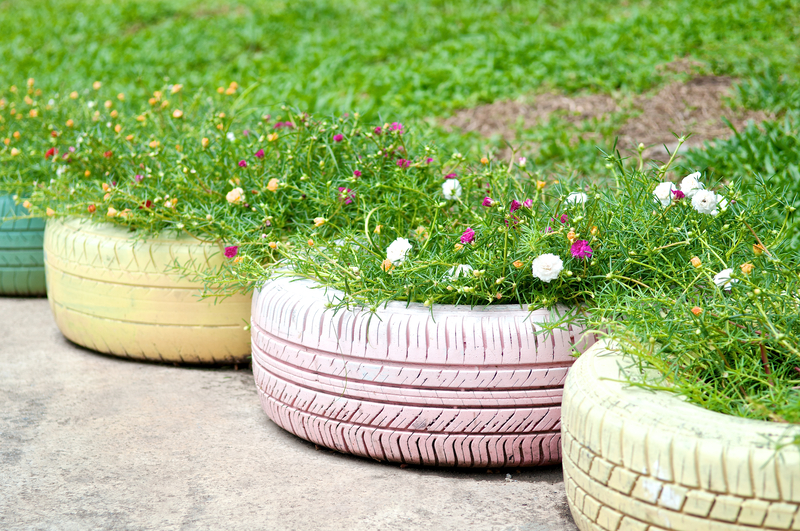What to Do With Old Couches and Bulky Furniture: A Comprehensive Guide
Are you faced with the challenge of finding what to do with old couches and bulky furniture? Whether you're moving, renovating, downsizing, or just looking to refresh your living space, figuring out how to efficiently, sustainably, and affordably dispose of large pieces is crucial. In this all-encompassing guide, we'll explore creative, eco-friendly, and responsible solutions for giving your old sofas, oversized chairs, and other large items a new life. Discover all the methods, best practices, and local resources for handling your old furniture the smart way!
Why Proper Disposal of Bulky Furniture Matters
Before you toss that old loveseat to the curb, consider the environmental impact. Every year, millions of couches and other large household items end up in landfills, contributing to pollution and unnecessary waste. Many materials in old furniture, such as wood, foam, fabric, and metal, can be recycled or repurposed. Understanding the best practices for large furniture disposal ensures you're making a responsible choice for your community and the planet.
The Environmental Consequences of Improper Furniture Disposal
- Added landfill stress: Bulky items take up significant space in landfills, hastening capacity overload and groundwater contamination.
- Missed recycling opportunities: Many parts of old couches and chairs - like metal frames, wooden components, and fabrics - are recyclable.
- Potential hazardous waste: Some furniture contains chemicals or flame retardants that can leach into the environment.

10 Smart Ways to Dispose of Old Couches and Bulky Furniture
Ready to bid farewell to your heavy furniture but don't want it to go to waste? Below are the most effective methods to deal with your old, unwanted pieces. From donating and selling to upcycling and responsible disposal, this guide gives you options tailored to your needs and local resources.
1. Donate to Local Charities and Nonprofits
If your furniture is gently used and in good condition, consider donating it. Many organizations will gladly accept clean, usable couches and large items to support families in need. Popular recipients include:
- Habitat for Humanity ReStores - Accepts couches, chairs, and tables. Items are resold to support affordable housing projects.
- Goodwill and Salvation Army - Many branches offer pick-up services for large donations.
- Local shelters and community centers - Reach out to see if they need furniture for their programs.
For a hassle-free experience, call ahead to confirm your item is acceptable and arrange a pick-up or drop-off. This way, you'll extend the life of your furniture and help families furnish their homes affordably.
2. Sell Your Furniture Online or in a Garage Sale
Looking to make some extra cash from your old couch or sectional? Today's online platforms make selling bulky furniture easy and fast.
- Facebook Marketplace
- Craigslist
- OfferUp
- LetGo
- Nextdoor
When listing, remember to include clear photos, measurements, and a truthful description. Be honest about any stains or damage. For local sales, specify that buyers must arrange pick up of bulky furniture themselves. Garage or yard sales are also a great way to offload multiple items at once while connecting with neighbors.
3. Arrange Curbside Pickup With Your Municipality
Most cities offer bulky item pick-up services through waste management or special collection programs. Each municipality has slightly different regulations, but here's what you should know:
- Check your city's website or call local public works for policies and pick-up guidelines.
- Some programs operate monthly or by appointment and may have fees.
- Preparing your couch for collection may involve moving it to a certain spot, removing feet or cushions, or wrapping.
- Note: Most curbside services will not accept mattresses, electronics, or items contaminated with pests or mold.
Proper preparation ensures a smooth, legal pick-up and keeps your street tidy.
4. Hire a Professional Junk Removal Service
If you need immediate removal or have items in poor condition, junk haulers are a fast and efficient solution. Professional services will remove your bulky furniture directly from your home, saving you heavy lifting and time.
- Examples include: 1-800-GOT-JUNK?, College Hunks Hauling Junk, LoadUp
- Many companies will recycle or donate whatever possible.
- Request a quote in advance, as costs are based on item size, number, and location.
This option is ideal for time-sensitive moves or large cleanouts.
5. Recycle Your Old Couches and Large Furniture Pieces
Many furniture components are recyclable, especially metal springs, wooden frames, and certain fabrics. Here's how to proceed with furniture recycling:
- Contact local recycling centers and inquire if they accept large furniture.
- Some centers require you to disassemble the piece yourself into manageable components.
- For upholstered items, ask about textile recycling programs in your area.
- Check if the store where you bought your couch offers a take-back or recycling service when you purchase a replacement.
Proper recycling minimizes landfill waste and supports the circular economy.
6. Repurpose or Upcycle Your Old Couch
Are you creative? Repurposing furniture is rewarding and eco-friendly, letting you give old pieces a new identity or function. Here are some ideas:
- Convert a couch into seating benches or pet beds by removing arms and reupholstering.
- Use the frame, springs, or foam for DIY projects, like planters, patio seats, or art installations.
- Refinish wooden segments for bookshelves, tables, or wall shelves.
This option is ideal for those with DIY aptitude, a unique style, or a love for sustainability.
7. Offer to Family, Friends, or Neighbors
Sometimes, the simplest solution is asking around! Post a message in your building lobby, email list, or community board offering the furniture for free. Your old, bulky couch might be the perfect addition to a friend's rec room or a neighbor's first apartment.
Sweeten the deal by including delivery to the recipient if you can transport the item easily.
8. Trade or Barter for Other Items or Services
On local community boards or barter groups, you can often exchange bulky furniture for other goods or services. For example, trade your old sectional for moving help, handyman services, or even groceries.
- Check: Facebook groups, Nextdoor's "Free & For Sale" sections, or neighborhood swap events.
9. Contact Scrap Dealers or Material Recovery Facilities
If your furniture is beyond repair or mostly made of metal, a local scrap dealer or material recovery facility (MRF) may buy or take the metal parts for recycling. Strip your old couch of fabric, foam, and wood, then deliver the frame parts to the dealer.
This is an environmentally sound approach when donating or repurposing isn't possible.
10. Check for Special Collection Events or Bulk Waste Days
Many municipalities organize bulk trash collection days or hazardous waste events where residents can dispose of old couches, appliances, and bulky items for free or a small fee. Visit your town's website or call municipal offices for the next scheduled collection.
- Some communities also offer seasonal curbside collection in spring and fall.
What Not to Do With Old Couches and Bulky Furniture
Improper disposal methods can lead to fines, neighborhood complaints, and environmental harm. Please avoid the following:
- Dumping furniture by the roadside or in forests/empty lots (illegal and polluting).
- Abandoning furniture in apartment hallways or dumpsters unless permitted by building management.
- Burying or burning upholstered furniture, as they can release toxic fumes and break local laws.
Always choose a legitimate, environmentally responsible option for your old, oversized furniture.
Preparing Your Furniture for Removal, Donation, or Sale
Tips for Hassle-Free Furniture Removal:
- Clean your furniture: Wipe down surfaces, vacuum upholstery, and treat stains as best as possible, especially if donating or selling.
- Measure doorways and hallways: Ensure your couch or item fits through exits before moving day.
- Disassemble if possible: Remove legs, arms, or cushions to reduce size and weight.
- Organize all hardware in a labeled bag for reassembly or recycling.
Pitfalls to Avoid When Disposing of Large Furniture
Managing old couches and bulky items can be challenging. Steer clear of these common mistakes:
- Waiting until the last minute: Some donation centers schedule pick-ups weeks in advance. Plan ahead!
- Not checking regulations: Confirm guidelines for curbside pick-up, donation, or recycling in your area.
- Forgetting to remove personal items: Double-check for valuables before disposal.
- Unknown material restrictions: Some centers can't accept furniture with pests, mold, or severe water damage.
Eco-Friendly Disposal: Why It Matters
Choosing sustainable solutions for old furniture disposal helps:
- Reduce landfill waste
- Support charitable causes
- Minimize greenhouse gas emissions from manufacturing new furniture
- Contribute to the circular economy by encouraging reuse and recycling
If you care about the planet and your local community, exploring responsible options for disposing of old bulky furniture is a small step with significant impact.

Frequently Asked Questions
Can I leave my couch on the curb for free pickup?
That depends on your local regulations. Most cities require scheduling a special bulk pickup or drop-off appointment. Leaving furniture on the curb without arrangement often results in fines.
Are there furniture banks for donations?
Yes! Many regions have furniture banks that supply gently used pieces to low-income families. Search online for one in your city.
How can I recycle upholstered furniture?
Contact your city's waste management or recycling center to see if they accept upholstered items. Sometimes, you'll need to remove metal and wood for standard recycling, while fabric may go to a textile recycling facility.
Can I rent a dumpster for bulky furniture?
Some dumpster services allow large furniture, but always check the provider's rules. Dumpsters are useful for large remodels or multiple piece disposal, but are more costly and may require driveway space.
Conclusion: Responsible Ideas for Getting Rid of Old Couches and Bulky Furniture
Saying goodbye to old couches and other large furniture doesn't have to be stressful or wasteful. From donation and reuse to recycling and creative upcycling, there are dozens of effective, eco-friendly ways to send your unwanted items on a new journey. With a little planning, you can clear space at home while benefiting the environment and your community.
So next time you're wondering what to do with old couches and bulky furniture, use this guide to choose the best, most responsible path for your needs!